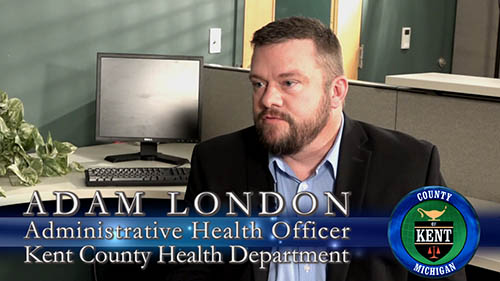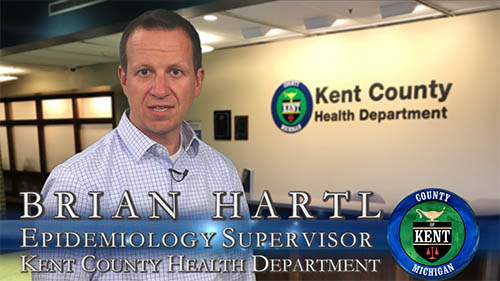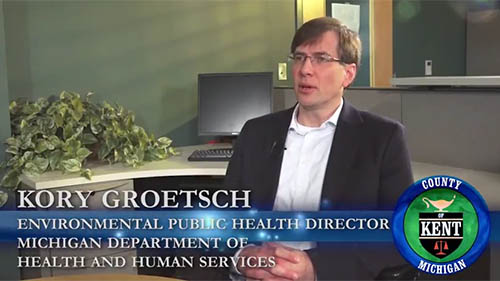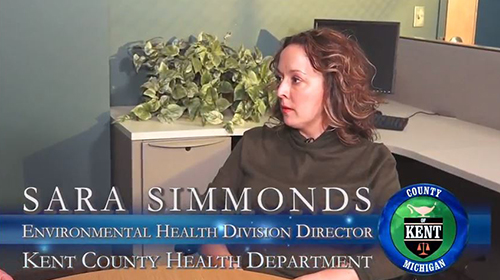Northern Kent County PFAS Investigation
Frequently Asked Questions
FAQ Videos
-
What is PFAS?
Perfluoroalkyl and polyfluoroalkyl substances (PFAS) are a large group of man-made chemicals that are fire resistant, and repel oil, stain, grease, and water and have been used in industry and consumer products worldwide since the 1950s. PFAS are used in fire-fighting foams, nonstick cookware, fast food wrappers, some cosmetics and cleaning products, as well as in industry and manufacturing.
- PFAS do not occur naturally, but are widespread in the environment.
- PFAS are found in people, wildlife and fish all over the world.
- Some PFAS can stay in people’s bodies a long time.
- Some PFAS do not break down easily in the environment.
-
How can I get my water tested?
A knowledgeable environmental consultant should sample your well water to obtain accurate test results due to specific sampling guidelines. For water sampling questions please contact Rose and Westra, a Division of GZA Mark Westra/Lori Powers at House-Street@gza.com or (616) 258-7234
-
Is there a safe level of PFAS?
The Environmental Protection Agency (EPA) has set a Lifetime Health Advisory (LTHA). Concentration of PFOA and PFOS (chemicals in the PFAS family) in drinking water should not be greater than 70 parts per trillion (0.07 parts per billion) either individually or combined. At this time, scientists are still learning about the health effects of exposures to mixtures of PFAS. For more information, click here.
-
Is the water safe to use?
If you are connected to a city/municipal water supply, please contact the supplier directly for information
If you have a well in the affected area and your water is being tested, you should be using an alternative water source (such as bottled or filtered water) for drinking, food preparation, cooking, brushing teeth or any activity that might result in ingestion of water until your test results come back and further instructions are provided.
If the water you use is above the EPA health advisory level associated with exposure to PFAS, PFOS, or PFOA, you can reduce exposure by using an alternative water source. You may also use an NSF P473 approved filter. Filters must be selected, operated and maintained to manufacturers specifications.
Touching the water will not harm you. You can bathe, do your dishes, launder your clothes and clean with your water.
-
Is the food from my garden safe to eat?
If you have a well in the affected area you should not be eating food that has been exposed to your well water. Michigan Department of Agriculture and Rural Development (MDARD) is responsible for providing guidance regarding livestock and farming; residents should take the same precautions if they are raising or growing food on their property.
-
Is the water safe for animals?
If you have a well in the affected area and your water is being tested, your animals should currently be using an alternative water source (such as bottled or filtered water). If you are connected to a city/municipal water supply, please contact the supplier directly for information.
If you are outside of the affected area but still have a concern, bottled water can be used as a precautionary measure. For water sampling questions please contact Rose and Westra a Division of GZA Mark Westra/Lori Powers at House-Street@gza.com or (616) 258-7234
-
Is there a map of the contaminated area?
Please contact the Michigan Department of Environmental Quality, the lead agency for the investigation of the dump sites. DEQ Hotline 1-800-662-9278, DEQ’s website.
-
Who is performing the investigation?
The Michigan Department of Environmental Quality is the lead agency for the investigation of the dump sites. DEQ Hotline 1-800-662-9278, DEQ’s website , DEQ’s website.
-
What is Wolverine doing to fix this?
Referral to Wolverine 616-866-5627, HouseStreet@wwwinc.com.
-
What if I know of a potential dump site?
Call DEQ at 1-800-662-9278 and ask to report a potential dump site or fill out this referral form..
-
What is going on in Belmont?
Referral to DEQ Hotline 1-800-662-9278, DEQ’s website..
-
What are the health effects of PFAS?
PFAS can cause health issues, but there is no conclusive evidence that predicts that PFAS exposure will result in health problems. Some scientific studies suggest that certain PFAS may affect differentsystems in the body. The Centers for Disease Control and Prevention are working with various partnersto better understand how exposure to PFAS might affect people’s health—especially how exposure to PFAS in water and food may be harmful. Although more research is needed, some studies in people have shown that certain PFAS may lead to high cholesterol, ulcerative colitis, thyroid disfunction, testicular cancer, kidney cancer, elevated uric acid associated with gout, elevated liver function tests and elevated blood pressure during pregnancy. For fetuses, there could be the potential for lower birth weight.
For more information: click here.
-
Can I get tested to see if I have PFAS in my blood?
Please consult with your primary care physician, blood testing for PFAS and other blood tests are not routinely recommended. If you are concerned and choose to have your blood tested, test results will tell you how much of each PFAS is in your blood but it is unclear what the results mean in terms of possible health effects. The blood test will not provide information to pinpoint a health problem nor will it provide information for treatment. The blood test results will not predict or rule-out the development of future health problems related to a PFAS exposure. Only a handful of laboratories in North America can test blood for perfluorooctanoic acid (PFOA), perfluorooctane sulfonate (PFOS), and other related Perfluoroalkyl and polyfluoroalkyl substances (PFAS).
If you have specific health concerns, please contact MDHHS 1-800-648-6942
-
How do I choose a water filter?
An NSF P473 approved filter should be used. Filters must be selected, operated, and maintained to manufacturers specifications.
-
Can boiling my water remove PFAS?
No, do not boil water that is known to be contaminated with PFAS. Boiling the water will raise its PFAS levels.
- Versluis and Freska Lakes Fish Advisory





